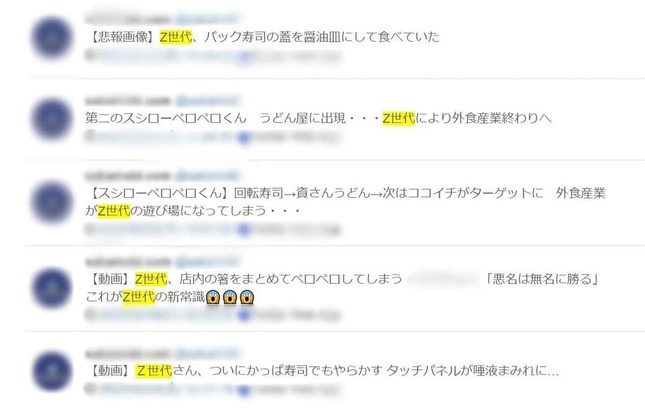“Finally find out why Generation Z repeats robberies.” In January 2023, in response to the successive reports of serial robberies committed by young people and nuisances at restaurant chains, posts that gave a negative impression to “Generation Z” were spread on SNS. ing.
Experts have warned, “It is irresponsible as an adult to label Gen Z unconditionally as a negative label precisely because it is a generation that can have ‘diverse values.'”
-
Experts warn against “bashing Generation Z” on SNS (image is an image)
-

A post on a Twitter account that links nuisances at restaurants with “Generation Z”. As of February 10, the account has been frozen for violating Twitter’s usage rules (the photo is partially edited).
“Generation Z” is young people born in the late 1990s to around 2010
Generation Z generally refers to people born between 1996 and 2010. In the American generation classification, it is positioned as the generation following the Y generation (born between 1980 and 1995, also known as the “millennial generation”), and in Japan, it was selected as one of the top 10 U-can “new word / buzzword awards” in 2021. In recent years, the word has become established.
In the article “What is Generation Z? Differences from the millennial generation, 6 characteristics, 3 points that capture the heart” of the owned media “PR TIMES MAGAZINE” of the news release distribution site “PR TIMES”, the characteristics of Generation Z are ” Six categories were cited: smartphone natives, digital natives, SNS natives, emphasis on Taipa along with cost performance, consumption behaviors that emphasize value for oneself, and high interest in social issues.
Daniel Takeda, a writer born in 1997, wrote in his book “The World and My A to Z” (Kodansha, November 2010), which compares Japanese and American culture from the perspective of Generation Z, “I will ‘revolutionize society’. The image of ‘advanced digital natives’ is also being formed through the media,” he said, pointing out that the media creates a positive impression of Generation Z.
Under such circumstances, there are a series of posts on Japanese SNS that give a negative impression to “Generation Z” these days.
In January 2011, a series of robberies committed by young people occurred all over the country. There have also been reports of young people causing trouble at restaurants and other establishments. In response to the series of news, there were reactions using the word “Generation Z” such as “Generation Z is terrible”, “Generation Z is the work of Gen Z again”, and “Generation Z is really helpless”.
Some summary accounts say, “The reason why Generation Z repeats robbery, it will finally be revealed”, “Generation Z will go on a rampage at the supermarket this time”, and “The conveyor belt sushi terrorism by Generation Z will not stop”, etc. He tweeted by linking the topic of behavior with “Generation Z”. Posts alleging that Net slang with discriminatory nuances is being used among Generation Z have also gone viral.
By February 10, some accounts that had repeatedly posted posts that linked “Generation Z” to the serial robbery incidents and nuisances at restaurants were frozen by February 10 for violating Twitter’s usage rules.
“Somehow it’s someone else’s problem” “I don’t want to be lumped together” Opinions of young people
What do young people think about negative posts about Generation Z on social media? In an interview with J-CAST News, a man born in 1997 said, “I’m not very aware that I am Generation Z.” I don’t have a very good impression of disrespectful behavior.”
In addition, he said, “I am ignorant of the trends and common sense widely shared by the so-called ‘Generation Z’ generation.” I have never felt uncomfortable with labeling.”
On the other hand, a woman born in 2001 said, “Most of the people are decent people, but I don’t want to be with people who cause nuisances.” I don’t want to be lumped together just because I’m Generation Z.”
On February 5, 2011, Mr. Takeda, the author of “The World and My AtoZ,” said in an interview, “Because of the generation that can have ‘diverse values’ by being constantly connected to SNS and the Internet since childhood, it is It is irresponsible as an adult to simply stick the label of ‘
In addition, regarding the series of nuisances at restaurants and other places, he said, “Rather than the trends of the generation, young people who have not formed social responsibilities and ethics can use tools that can transmit anything to the whole world. Shouldn’t we take into account the impact of things that people have taken with them?”
Is the “Z generation image” made up true?
In his book “The World and My AtoZ”, Takeda criticizes the “Generation Z image” created by companies as follows.
“Marketing companies and consulting firms create the concept of ‘What is Generation Z?’ The prejudice and sense of incongruity created by creating “generation spokespersons” and forcing “the image of Generation Z that adults want to see” is increasing.An even bigger problem is that the Japanese media is facing the people of Generation Z in Japan. When people say, “I want to hear your opinion,” in fact, they often ask for “sharp social criticism that adults don’t want to do because it will be troublesome,” or “childish naivety.” It is too contradictory to want “opinions that represent Generation Z” even though the existence of diverse values is “Gen Z-ness”. there is
As an image of Generation Z, it is often said that they are highly interested in environmental issues and SDGs (Sustainable Development Goals). However, the man mentioned earlier said, “I’m not that environmentally conscious, so in the end it all depends on the individual.”
According to an online survey conducted in the summer of 2010 by Neomarketing (Shibuya-ku, Tokyo) targeting Generation Z and Generation Y, Generation Z was more interested in environmental issues than Generation Y. was also low. In the same survey, those who answered that they were “highly aware of the SDGs” among Generation Z were also in the minority.
In an interview with Takeda, Takeda pointed out, “There have always been editorials saying, ‘Young people these days are amazing’ and at the same time, ‘Young people these days are hopeless.'” On top of that, he said, “While thinking about why Japanese young people run into such problem behavior from the social background, it is also necessary to think about ‘why society as a whole denounces such pranks of young people.’ There will be,’ he said.
(J-CAST News reporter Shonosuke Sato)
![Overheating on SNS “Generation Z hit” Robbery and nuisance spear ball also … “It is irresponsible to stick a negative label unconditionally” Warning bell: J-CAST News[Full text] Overheating on SNS “Generation Z hit” Robbery and nuisance spear ball also … “It is irresponsible to stick a negative label unconditionally” Warning bell: J-CAST News[Full text]](https://www.j-cast.com/images/origin/2023/02/news_20230210171804.jpg)

